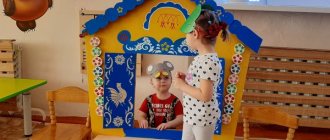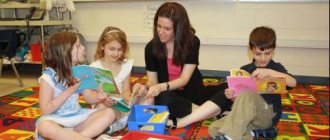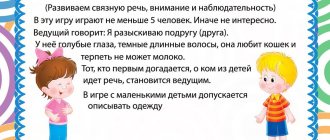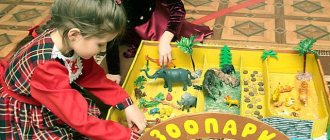Project for the development of cognitive and speech activity of children of senior preschool age
Project for the development of cognitive and speech activity of older preschoolers (5-7 years old) “Young Writers”
Explanatory note The “Young Writers” project is designed for children of older preschool age. The project implementation period is during the 2017-2018 academic year. The purpose of the project: to orient parents to the development of speech creativity in children, involvement in family reading; the formation of interest in books in children of senior preschool age, the development of cognitive and speech activity through speech creativity. Project participants: Preschool children, parents, teachers. Project type: Social-pedagogical, long-term. Duration: 1 year. Justification for the need to implement the project In accordance with the Federal State Educational Standard for preschool education, speech development includes “proficiency in speech as a means of communication and culture; enrichment of the active dictionary; development of coherent, grammatical and correct dialogical and monologue speech; development of speech creativity; development of sound and intonation culture of speech, phonemic hearing; acquaintance with book culture, children's literature, listening comprehension of texts of various genres of children's literature; formation of sound analytical-synthetic activity as a prerequisite for literacy training.” Thus, the book occupies not the last place in the development of a child’s speech, the development of his creative and intellectual abilities. It is necessary to instill a love of reading from early childhood. And who, if not parents, will lay the foundation for the formation of a child’s reading competence. Family reading prepares a person for a relationship with a book, awakens and deepens attention, and forms the need for reading. The lack of need for reading in adults is a consequence of its lack of development from early childhood. Family reading promotes early and correct mastery of native speech. Relevance. The problem of introducing preschool children to fiction is one of the most pressing, since, having entered the third millennium, society came into contact with the problem of obtaining information from publicly available sources. In this case, it is children who suffer first of all, losing touch with family reading. In this regard, pedagogy faces the problem of rethinking the value guidelines of the educational system, especially the system of preschool education. And here mastering the folk heritage, which naturally introduces the child to the basics of fiction, becomes of great importance. According to V.A. Sukhomlinsky, “reading books is the path along which a skillful, intelligent, thinking teacher finds the way to a child’s heart.” Addressing the problem of introducing preschool children to fiction as a means of speech development is due to a number of reasons: firstly, as an analysis of the practice of introducing children to fiction has shown, in the education of preschool children, familiarity with fiction is used insufficiently, and only its surface layer; secondly, there is a public need for the preservation and transmission of family reading; thirdly, educating preschoolers with fiction not only brings them joy, emotional and creative inspiration, but also becomes an integral part of the Russian literary language. Main part 1. Goal and objectives of the project Goal of the project: orientation of parents to the development of speech creativity in children, involvement in family reading; the formation of interest in books in children of senior preschool age, the development of cognitive and speech activity through speech creativity. Objectives: 1. To generate pupils’ interest in fiction 2. Involve parents of pupils in family reading of literature. 3. Expand and activate children's vocabulary. 4. To introduce the main genre features of fairy tales, stories, and poems. 5. Improve children’s artistic and speech performing skills when reading poems and dramatizations. 6. Draw children’s attention to visual and expressive means; help to feel the beauty and expressiveness of the language of the work. 7. Develop creativity in children. 2. Expected result 1. Use of family reading by parents as a means of comprehensive development of the child 2. Increased opportunity and accessibility for project participants to interact with social partners on the issue of developing reading competence. (Children's library No. 25). 3. Awakening interest in children and parents in reading fiction. 4. Positive dynamics of children’s speech development. 5. Formation of the need for family reading. 3. Types, forms and areas of activity used in the process of implementing the project Forms of work • Reading fiction in a group and family. • Teacher's story. This is a relatively free transfer of text. Storytelling provides great opportunities to attract children's attention. • Theatricalization of works or their excerpts. This method can be considered as a means of secondary familiarization with a work of art. • Thematic exhibitions of literature, independent viewing of books by children. (collaboration with library No. 25) • Excursions, quizzes, competitions held jointly with social partners. • Memorizing poems, getting to know writers. • Productive activity. Creating books with your own hands on a given topic. • Consulting parents on family reading issues. Basic principles of the project 1. The principle of integration: the use of reading literature as a means of cognitive and aesthetic development of children. 2. The principle of relying on the child’s emotional and sensory sphere requires creating conditions for the emergence of emotional reactions and the development of emotions that focus the child’s attention on the object of cognition, his own action and deed, which is achieved through empathy and forecasting the development of the situation. 3. The principle of continuity and continuity of education in the family and kindergarten on the basis of cooperation (so that they do not replace, but complement). Stages of the project implementation Stage I – Diagnostic: questioning parents, conversations with children, monitoring the cognitive and speech development of children, determining the level of interest of children and parents in reading fiction. Deadline: September. Stage II – Theoretical: drawing up a work plan for the project, developing plans for interaction with social partners, parents and children. Parent school (round table on the topic of family reading); selection of a list of literature recommended for family reading; development of regulations for the competition “Best Book Presentation” Deadline: October-November. Stage III – Practical: implementation of plans for interaction with social partners, parents and children. Project design. Duration: December-May. Stage IV - Final. Summing up the results of the project, reviews from parents, monitoring of cognitive and speech development of children. Deadline: May. Conclusion to the project “Young Writers” This project can be implemented in most preschool institutions. The project does not require significant material costs, and the impact on participants is difficult to underestimate. Parents of students and social partners are actively involved in its implementation. Consequently, the interaction between the family, child and educators is significantly increased, which makes it possible to qualitatively solve this problem. Possibility of disseminating the project at the local level: implementation of the “Young Writers” project in other NGO groups. At the municipal and regional levels: exchange of experience (posting materials on the NGO website); dissemination of experience on pedagogical portals and Internet sites. List of used literature. 1. Ushakova O. S., Strunina E. M. Speech development in children 5-6 years old. Didactic materials; Ventana-Graf - Moscow, 2010. 2. Chulkova A. V. Formation of dialogue in a preschooler; Phoenix - Moscow, 2008. 3. Gerbova V.V. Speech development in kindergarten. Program and methodological recommendations; Mosaic-Synthesis - Moscow, 2008. 4. Paramonova L. G. Exercises for speech development; AST - Moscow, 2012 5. Gubanova N.F. Development of gaming activities; Mosaic-Synthesis - Moscow, 2012 6. Maksakov A.I. Does your child speak correctly? Mosaic-Synthesis - Moscow, 2005. 7. Gerasimova A.S. A unique guide to speech development / Ed. B.F. Sergeeva. – 2nd ed. – M.: Iris – Press, 2004. 8. Dubinina T.N. Be able to explain and prove: the development of coherent speech in preschool children: A manual for teachers of preschool institutions. - Belarus. – 2002. 9. Bondarenko A.K. Verbal games in kindergarten, “Enlightenment”, 1977. Appendix 1 Long-term plan for working with children and parents, within the framework of the “Young Writers” project September. Getting to know the library, developing an interest in books. Involving parents in family reading. Excursion to children's library No. 25. Registration of family subscriptions, preparation of a list of recommended reading for children's literature. Getting to know types of books, talking about the meaning of books for people, talking about your favorite fairy tales. October. The Red Book through the eyes of children (as part of the Year of Ecology). Formation of ideas about animals and plants that need human protection. Fostering interest in books about nature and animals. Formation of prerequisites for environmental literacy. Exhibition of literature for children and parents, excursion to the local history museum of Surgut. Exhibition of books made by children and parents “The Red Book through the eyes of children.” Reading and looking at books about the nature of the native land and country, composing stories and riddles about animals. November . Book "About Mom". Acquaintance with works about family, mother. Cultivating a respectful attitude towards loved ones. Formation of the ability to create an image of a mother in drawings and stories. Creation of homemade books by children and teachers for the Mother's Day holiday. Reading and dramatization of works about family. Writing stories about mom. December - January . New Year's adventures. Getting to know New Year's traditions through viewing and reading fiction. Development of fantasy, imagination, detailed acquaintance with the professions of a writer, illustrator, editor. Exhibition of literature for children and parents “What is the New Year”, making family crafts using literary sources. Presentation of the book “New Year’s Adventure of the Purple Octopus.” Memorization and dramatization of poems “New Year’s Incident” by V. Berestov and others. Joint writing of a fairy tale by children and a teacher, design of the book “New Year’s Adventure of the Purple Octopus.” February . Defenders of the Fatherland. Consolidating knowledge about who the defenders of the fatherland are, getting to know the heroism of Russian soldiers and ordinary people during the war, through reading fiction, developing cognitive and speech activity. Visiting a thematic event in children's library No. 25. Reading poems, memorizing poems, composing your own stories about the army and soldiers. March. "Miracles of Family Reading" Encouraging parents to engage in family reading and joint productive activities with their children. Clarifying the development of children's ability to understand literary works. Conducting a competition for presentations of the most liked book from the recommended list of literature (together with Children's Library No. 25). Conversations “My favorite book”, “My favorite hero”. Exhibition of illustrations for favorite fairy tales. April Theater and books. Forming an understanding of the relationship between theater and literature, the ability to compare theatrical productions with literary works, familiarity with the concepts of folk and author's fairy tales. Joint visit to the Surgut Philharmonic. Preview of the play “Geese and Swans”. Reading, telling Russian folk tales, their dramatization. May. We are "Young Writers". Strengthen the ability to invent, fantasize within the framework of literary works, and develop cognitive and speech activity. Performance for parents “Zayushkina’s hut”, Performance for children (with the participation of parents). Thinking through the plot of a fairy tale in a new way together with children, dramatization. Appendix 3 Questionnaire for parents 1. Does your family read books? __________________________________________________________________ 2. Do you consider it necessary to introduce children to reading fiction? __________________________________________________________________ 3. Do you read books to your children? __________________________________________________________________ 4. Do you visit the library? __________________________________________________________________ 5. What book did you read to your child this month? ___________________________________________________________________ 6. Do you think that reading fiction contributes to your child’s cognitive development and the development of his speech?________________________________________________________________ 7. Do you need help in selecting literature for children to read?________________________________________________________________ 8. Do you want to attend joint events aimed at to introduce your child to fiction and cognitive speech development of children? Photo gallery of the project.
We recommend watching:
Project in kindergarten for older preschoolers 5-7 years old on legal topics Project in the senior group of kindergarten Project in the senior group on the topic “Trees and shrubs in spring” Project in the senior and preparatory group of the kindergarten
Similar articles:
Project for children of the senior group “Our cheerful garden”
Long-term project for the development of sound culture of speech “Our friends - Zvukovichki” with children 5-6 years old
| Games to develop auditory attention | “Storks - Frogs” Purpose: to teach children to respond to commands. 1 stork clap, 2 frog clap | Explanation, practical solution |
| Games for developing sound pronunciation | Goal: correction of the pronunciation of sounds R-Рь | Game exercise “Horse”, “Alarm Clock” |
| Games to develop phonemic awareness | Goal: Automation of sound r.l. | Interactive game on “Sounds in the kingdom of sounds R and L” |
| Tongue exercises | Purpose: to exercise tongue mobility | Game exercise “Sewing machine”, “Delicious jam”, “Brushing teeth” |
| “The popular word teaches us to be friends and speak beautifully” | Goal: increasing the level of sound culture of children's speech through familiarization with small forms of folklore. | Reading and learning proverbs and sayings about speech |
| April | ||
| Games to develop speech breathing | "Dimple Ball" Goal:Development of correct diaphragmatic breathing | Explanation, demonstration, practical exercise |
| Games to develop auditory attention | “Quiet-loud” goal: to teach children to respond to the sound of a voice (quiet-loud) | Explanation, practical solution |
| Games for developing sound pronunciation | Goal: correction of the pronunciation of sounds R-Рь | Game exercise “Crow”, “Centipede” |
| Games to develop phonemic awareness | Goal: Automation of sound k.g. | Interactive game on “Sounds in the kingdom of sounds K and G” |
| Tongue exercises | Purpose: to exercise tongue mobility | Game exercise “Football”, “Stork’s Beak” |
| "Speech of the peoples of the Volga region" | Goal: To form in preschoolers a cognitive interest in the speech culture of the peoples of the Volga region | Watching videos |
| May | ||
| Fairy tale performances | Goal: to form the sound culture of speech through theatrical performances | Master class with children “By playing, we develop speech” |
| "Young Talents" | Goal: To teach children to improvise using gesture and word; Help children remember the poem and read it expressively. | Holding a reading competition |
Expected results of the project:
At the children's level:
-children will learn to reproduce the rhythm of speech and use speech breathing correctly;
-children will develop the ability to hear and reproduce the sound image of a word, correctly convey its sound;
-children will develop the ability to hear an intonationally distinguished vowel or consonant sound in a separate word;
-children will learn to pronounce words intonationally, emphasizing the sound required by articulation
Assessing the effectiveness of project implementation
This project is interesting in that it involves the use of an integrated approach to solving problems in the development of sound culture of speech through games and exercises, as well as the use of new gaming technologies for the development of sound pronunciation. Preparation for learning to read and write in preschool age is closely related to the sound culture of speech. If a child does not pronounce sounds correctly, cannot distinguish and isolate them, or select words with a certain sound, then the process of mastering the initial elements of literacy will be difficult. The development of a culture of sound speech is an integral part of preschool childhood, which also shapes thought processes. All material on the selection of methods and means aimed at developing the sound culture of speech is systematized in a card index of games and exercises, which allows you to organize different types of exercises with interest throughout the year gaming activity. It is also necessary to note the implementation of unity of educational interaction with the families of pupils. Based on the results of a repeated examination by a speech therapist, the analysis of the results of the level of development of speech sound culture in children of senior preschool age increased by 23% (September 2021 -61% (13d), May 2021 - 90% (19d)). Children have mastered correct, clear pronunciation, learned to determine the sound composition of a word, and are able to use various means of intonation expressiveness of speech, which is the basis for successful communication, establishing social contacts and shaping the child’s personality as a whole.



